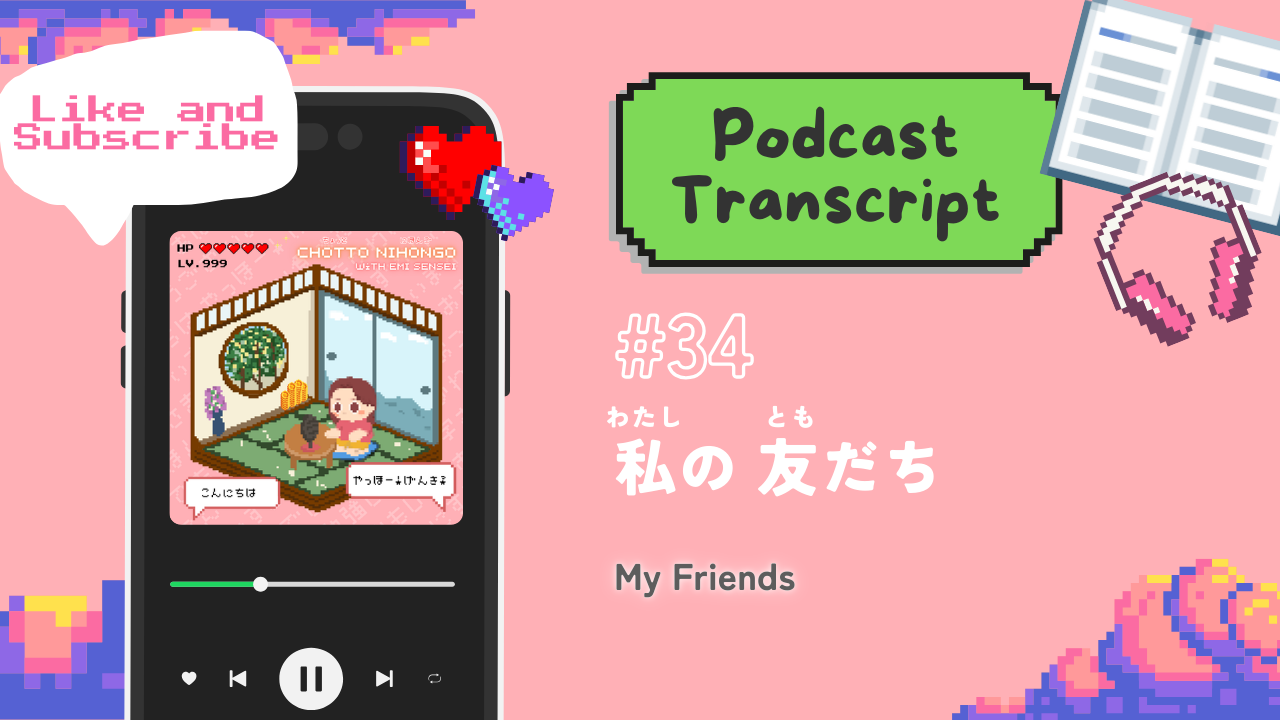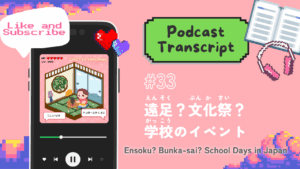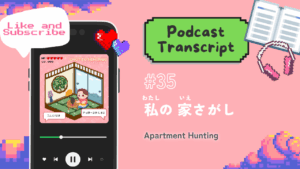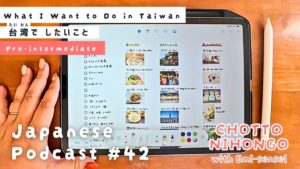おすすめの Google 拡張機能です!新しい言葉を勉強しましょう!
Here are the recommended Chrome extensions! Let’s learn new words here!
ポッドキャストプラットフォーム|Platforms of Podcast
こちらの記事は、配信中のポッドキャストのスクリプトです。
ぜひ、ポッドキャストを聞きながら読んでください。
 えみ先生
えみ先生もう聞いた人は、クイズをチェックしましょう!
ことばワークシート|Vocabulary Worksheet from This Episode
えみ先生がエピソードでつかった、ちょっとむずかしいことばを、ワークシートにまとめました。
ワークシートは、エピソードごとに、ひとつひとつ作っています。
それぞれ1ドルです。 (今は無料で プレゼントしています!🎁)
その1ドルが、えみ先生のポッドキャストのサポートになります。🫶
【えいご】English Translation
I made a worksheet with some of the slightly difficult words from each episode.
Each worksheet is created just for that episode.
Each one is only $1. (Giving it away for free now!)
And that $1 is a kind way to support my podcast. 🫶
ちょっとクイズ!|CHOTTO Quiz!
ポッドキャストを聞いた人は、ちょっとクイズを解いてみましょう。
むずかしいときは、下のスクリプトを読んで、もう一度クイズをチェックしてみてください。
【えいご】English Translation
Answer these quiz questions if you’ve listened to a new episode of my podcast.
If it was difficult, read the transcript below and try again.
❓ うちなータイムは、どんな文化ですか?|What kind of culture is Uchina Time?
うちなータイムは「沖縄時間」という意味で、ゆっくりな時間のことです。
Uchina Time means “Okinawa Time” and it is a slow, relaxed kind of time.
❓ 昔は、友達とどんな話をしていましたか?今はどんな話をしていますか?|What did Emi-sensei talk about with friends in the past? What do they talk about now?
昔は授業や宿題の話をしていました。今は仕事や生活の話をしています。
In the past, they talked about classes and homework. Now, they talk about work and daily life.
❓ えみ先生の 沖縄の友だちは どんな人たちですか?|What kind of people are Emi-sensei’s friends from Okinawa?
明るくて おおらかで、よく しゃべります。🗣️✨
They are cheerful, easygoing, and talk a lot.
ポッドキャストのスクリプト|Transcript of Podcast
エピソード34「私の友だち」
このポッドキャストは、初中級(Pre-Intermediate)レベルです。
おはようございます。こんにちは。こんばんは。
日本語の先生、エミです。
今週は、けっこう ゆっくりな 1週間でした。
今週はちょっとお腹が痛くて大変だったんですけど、レッスンも少なかったし、今週もずっとアニメのワンピースを見たりして、リラックスしていました。
【えいご】English Translation
Good morning. Hello. Good afternoon.
I am a Japanese teacher, Emi.
This week was rather slow.
I had a little stomachache, so it was a bit difficult (to do anything), but since I had fewer lessons, I spent the week relaxing, watching the anime One Piece.
でも、やることはたくさんあります。
書かなきゃいけないフィードバックシートがたくさんあるし、
YouTubeの動画も作らなきゃいけないし、
ワークシートも作りたいし、
引っ越しの準備もしなきゃいけないし…、ほんとにたくさんあります。
でも がんばります。
はい。じゃあ…、
【えいご】English Translation
But I still have a lot to do.
I have many feedback sheets to write,
I need to make YouTube videos,
I want to make worksheets,
and I also need to prepare for moving… there really is a lot.
But I will do my best.
Okay, then…
ここで先週の質問をチェックしましょう。
先週は こんな質問をしました。
「みなさんの友達はどんな人ですか?親友はいますか?」
こんな質問でした。
【えいご】English Translation
Alright, now let’s check last week’s question.
Last week, I asked this question:
“What kind of friends do you have?
Do you have the best friends? What kind of people are they?”
That was the question.
今日は この質問から広げて、私の友達について話したいと思います。
みなさんのお友達はどんな人ですか?
おもしろい人ですか?
まじめな人ですか?
ちょっと変わっている人ですか?
それとも、がんばり屋さんですか?
友達は、人によって全然ちがいますよね。
私の友達も、いろんなタイプの人がいます。
【えいご】English Translation
Today, I want to expand on this question and talk about my friends.
What kind of people are your friends?
Are they funny?
Serious?
A little unusual?
Or hard-working?
Friends are completely different depending on the person.
My friends are also various types of people.
まず、みなさんに1つ質問があります。
みなさん、私の出身(ホームタウン)覚えていますか?
ヒントは、日本の南にある 1年中あたたかい場所です。
わかりますか?
【えいご】English Translation
First, I have a question for you.
Do you remember where I am from?
Here’s a hint: it is in the south of Japan and warm all year round.
Do you know?
はい、そうです。沖縄県です。
私は大学まで沖縄に住んでいました。
だから、私の友達のほとんどは沖縄の人です。
今でも沖縄に住んでいる人が多いですね。
私は、今 神奈川に住んでいますから、沖縄からはちょっと遠いです。
だから、年に1、2回ぐらい沖縄に帰って、友達と会います。
みんな結婚していて、子供がいる人もいます。
でも、私が帰るときはいつも予定を空けてくれます。
沖縄の友達は、とても明るい人が多いです。
よく冗談を言ったり、歌ったり、急にダンスをしたりする人もいます。
【えいご】English Translation
Yes, that’s right. Okinawa Prefecture.
I used to live in Okinawa until university, so most of my friends are from Okinawa.
Many of them still live in Okinawa.
I live in Kanagawa now, so it’s a little far from Okinawa.
So I go back to Okinawa about once or twice a year to see my friends.
Many of them are married and have children.
But when I go back, they always make time to see me.
Many of my Okinawan friends are very cheerful.
They often tell jokes, sing, or suddenly dance.
ここで ちょっと沖縄の文化を紹介したいんですけど、沖縄には「うちなータイム」という文化があります。
「うちなー」沖縄の方言です。
沖縄という意味です。
「うちなー」「沖縄」同じです。
「うちなータイム」は「沖縄時間」という意味です。
これは、ゆっくりした時間のことです。
【えいご】English Translation
I want to introduce a little about Okinawan culture here.
In Okinawa, there is a culture called Uchina Time.
“Uchina” is the Okinawan dialect.
It means Okinawa.
“Uchina” and “Okinawa” are the same.
Uchina Time means “Okinawa Time”.
It is a slow, relaxed kind of time.
たとえば、友達と「夜7時に居酒屋で会おう」と決めます。
夜7時です。
でも、7時半や8時に来る人もいます。
すこし遅れても、あんまり気にしないんです。
みんな「まぁ、いっか」という気持ちで のんびりしています。
【えいご】English Translation
For example, you may decide to meet friends at an izakaya at 7 pm.
It’s 7 pm.
But some people come at 7:30 or 8 pm.
Even if they are a little late, people don’t really mind.
Everyone has a “well, it’s okay” feeling and relaxes.
私の友達は そんなに遅刻しません。
でも、沖縄にはこんな文化がありますから、私の沖縄の友達はみんな性格が おおらかです。
「おおらか」は、easygoingという意味です。
だから、私も沖縄に帰るとゆったり過ごしてしまいます。
リラックスできます。
【えいご】English Translation
My friends don’t really come very late.
But because of this culture, my Okinawan friends are all おおらか(ooraka).
“Ooraka” means “Easygoing.”
So when I go back to Okinawa, I also spend my time relaxed.
I can feel comfortable.
アメリカ留学のときに 出会った友達もいます。
日本人もいるし、アメリカ人もいますね。
その子たちとも ときどき電話をしたり、メッセージをしたり、遊んだりします。
【えいご】English Translation
I also have friends I met while studying in the U.S.
Some are Japanese, and some are American.
I sometimes call or message them and hang out with them.
そして、大学のときは、沖縄の人だけじゃなくて、日本のいろいろな地域の友達ができました。
東京や大阪、福岡、新潟から来ている学生もいました。
大学の友達とは今でも遊びます。
学生のときは、授業や宿題の話をよくしていましたが、今では仕事や生活の話をすることが多いですね。
今日もこれから大学のときの友達と遊んできます。
楽しんできます!
【えいご】English Translation
During university, I made friends not only from Okinawa but from various regions in Japan.
There were students from Tokyo, Osaka, Fukuoka, and Niigata.
I still see some of my university friends.
When we were students, we often talked about classes and homework, but now we mostly talk about work and daily life.
Today, I am actually going out with one of my university friends. I’ll have fun!
そして、私には親友もいます。
「親友」何かわかりますか?
「親友」は、英語でベストフレンド、Best friendです。
幼稚園からの友達、中学校からの友達、高校からの友達、10年以上仲良くしている親友が何人かいます。
【えいご】English Translation
I also have Shinyuu.
Do you know what Shinyuu is?
Shinyuu in English means a “best friend.”
I have some best friends whom I have known for over ten years, from kindergarten, junior high, and high school.
幼稚園からの友達は、背の高さが同じだったので仲良くなりました。
今考えると ちょっとおもしろい理由ですよね。
その子は とても優しくて、私のやりたいことをいつも一緒にやってくれます。
私が行きたいカフェがあったら「行こう!」と言ってくれるし、食べたいものがあったら用意してくれたりします。
本当にありがたいです。
【えいご】English Translation
I became friends with a friend from kindergarten because we were the same height.
Looking back, that’s a little funny reason.
That friend is very kind and always does what I want to do together.
If I want to go to a certain café, she always says “Let’s go!” and if I want to eat something, she prepares it for me.
I am really grateful.
そして、中学校からの友達は とてもおもしろい人です。
よくしゃべって冗談も言うので、一緒にいて全然 あきません。
「飽きません(飽きない)」は「退屈じゃない」、「つまらなくない」と同じ意味です。
この人はとっても楽しい人です。
【えいご】English Translation
A friend from junior high is very funny.
She talks a lot and tells some jokes, so I never get bored being with her.
“Akimasen (Akinai *Nai-form)” = “Taikutsu janai” or “Tsumaranakunai” *They all mean “Not boring”).
This person is really fun.
高校のときの友達は、今は2人子供がいて、仕事も がんばっています。
日本語では「キャリアウーマン」という言葉がありますが、この友達は 本当にキャリアウーマンだと思います。
すごく仕事をがんばっています。
本当に がんばり屋さんです。
【えいご】English Translation
One of my friends from high school now has two children and works hard.
In Japanese, there is a word “career woman”, and I think this friend really is a career woman.
She works really hard.
She is really a hard worker.
こんな感じで、私にはいろんな友達がいます。
でもみんな明るい人です。
みんな明るくて、よくしゃべります。
たぶん、私が一番 しずかかもしれません。
大人になって会う時間は少なくなりましたが、会うといつも元気をもらえます。
やっぱり大切な友達ですね。
【えいご】English Translation
As I told (in this episode), I have many different friends.
But they are all cheerful.
They are all cheerful and talk a lot.
I might be the quietest in the circle.
As adults, we have less time to see each other, but whenever we unite, I always feel energized.
They are really important friends.
でも、私は来月 引っ越しをします。
今は 神奈川に住んでいますが、来月から石川県というところに住みます。
石川には友達がいないので、たぶん たくさん沖縄の友達に電話するかもしれません。
みなさんにはどんな友達がいますか?
親友はいますか?どんな人ですか?
よかったらコメントで教えてください。
【えいご】English Translation
But I will be moving next month.
I live in Kanagawa now, but from next month, I will live in Ishikawa Prefecture.
I don’t have any friends in Ishikawa, so I will probably call my Okinawan friends a lot.
What kind of friends do you have?
Do you have best friends? What kind of people are they?
Please tell me in the comments.
では、今日も みなさんに 質問があります。
「みなさん、引っ越しをしたことがありますか?
新しいお家を決めるとき、何をチェックしますか?」
私は来月引越しをするので、次のエピソードでは引越しについて話します。
これから荷物を たくさんまとめなければいけません。
忙しくなります。がんばります。
みなさんも引越ししたことありますか?
どうでしたか?
荷造り(パッキング)のアイデアありますか?
教えてください。
【えいご】English Translation
Now, I have a question for you today, as always.
“Have you ever moved to a new place?
When you choose a new house, what do you check?“
Since I will be moving next month, in the next episode, I will talk about moving.
I need to pack many things.
It will be busy. But I will work hard.
Have you ever moved?
How was it?
Do you have any packing ideas?
Please tell me.
今日のポッドキャストのスクリプトは、私のウェブサイトにあります。
ウェブサイトは、 en-nihongo.com です。
よかったら、ポッドキャストの感想や、質問の答えをコメントで教えてください!
じゃあ、また来週のポッドキャストで会いましょう。
じゃあね~!
【えいご】English Translation
A transcript for today’s podcast is on my website.
The website is en-nihongo.com .
I’d be very happy if you could share your thoughts/impressions or answer the question I asked in this episode!
I’ll see you in the next episode.
Jaa ne-!








コメント|Comment